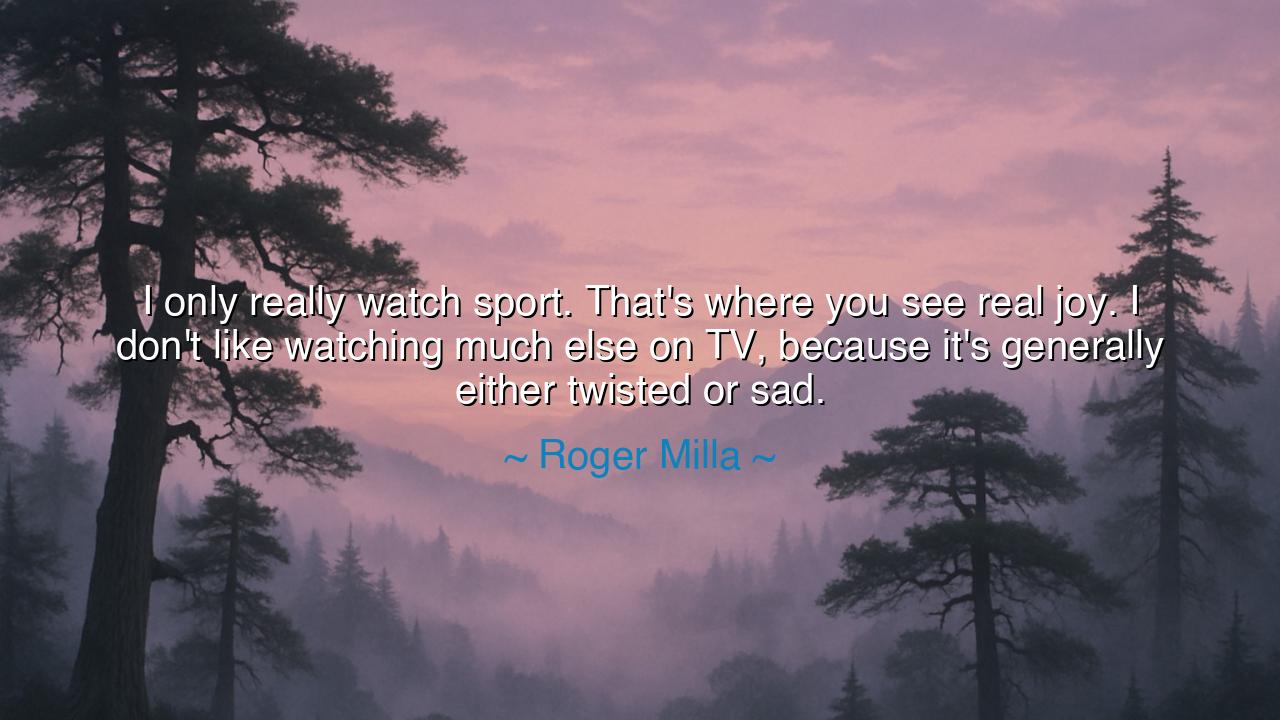
I only really watch sport. That's where you see real joy. I don't
I only really watch sport. That's where you see real joy. I don't like watching much else on TV, because it's generally either twisted or sad.






The words of Roger Milla, the legendary Cameroonian footballer, “I only really watch sport. That’s where you see real joy. I don’t like watching much else on TV, because it’s generally either twisted or sad,” rise like a hymn to the pure spirit of play. In this age where the world’s stories are painted with sorrow and corruption, his words call us back to the sacred field where humanity’s truest heart beats. Sport, to Milla, is not a pastime but a sanctuary—one of the last realms where joy, untainted and raw, still reigns. It is a realm where victory and defeat, struggle and grace, pain and elation intertwine to form the grand tapestry of what it means to be alive.
Born in Cameroon, Milla danced his way into the hearts of the world during the 1990 World Cup, when, at the age of 38, he scored and celebrated with that unforgettable rhythmic dance by the corner flag. He was not merely playing football; he was celebrating life itself. His joy was not theatrical—it was primal, pure, and human. The world saw in him not just an athlete, but a spirit untamed by age or expectation. From this living fire comes his insight: that sport, unlike much of the modern spectacle, remains one of the few places where we can still witness authentic emotion—unrehearsed, unedited, and free of cynicism.
What Milla laments in the rest of television—the “twisted” and the “sad”—is the distortion of truth in much of modern entertainment. Fiction often thrives on tragedy; news thrives on fear. The human spirit, constantly bombarded with tales of deceit, violence, and despair, grows weary. But in sport, the ancient ritual of competition endures. There, men and women do not pretend to be heroes—they become them. Their sweat is real, their triumphs hard-won, their tears genuine. It is a theater not of illusion but of human truth. To watch sport is to witness, even if for a fleeting moment, the divine pulse of joy that once filled the amphitheaters of Greece and the coliseums of Rome.
In the days of old, the ancients gathered not for cruelty alone but to honor excellence—arete, as the Greeks called it—the pursuit of virtue through mastery. The Olympic Games were not about medals, but about the celebration of human potential, the harmony between body, mind, and soul. When Roger Milla speaks of “real joy,” he echoes that same ancient reverence: the ecstasy that comes when a human being transcends limitation and touches something eternal. For him, that moment is sacred—and watching it rekindles faith in the beauty of existence.
There is a story told of the great runner Abebe Bikila, the Ethiopian hero who won the 1960 Olympic marathon barefoot, running through the streets of Rome like a messenger of destiny. He carried no weapon, no armor—only the strength of will and the pride of his nation. When he crossed the finish line, there was no bitterness, no artifice, only quiet triumph. That is the joy Milla speaks of—the joy born not of spectacle but of struggle, not of manipulation but of merit. It is the same joy found in the face of a child scoring their first goal, or a nation rejoicing together in victory. It is the purest mirror of the human soul.
Milla’s words also serve as a warning: that the modern world, obsessed with sorrow and scandal, risks forgetting what simple joy feels like. When our hearts grow numb from constant exposure to tragedy, we lose the ability to marvel at goodness, to be moved by excellence, to celebrate the beauty of effort. Sport, then, becomes a refuge—a temple of the spirit where the sacred flame of optimism still burns. Through it, we remember that joy is not childish—it is holy. It is the laughter of the gods echoing through mortal struggle.
So let this teaching be preserved for all who come after: seek joy where it is real. Turn your gaze from what is twisted and sorrowful, not out of denial, but out of preservation of the soul. Watch those who strive, who fail and rise again, who play with hearts unburdened by deceit. In them, you will see a reflection of life’s truest meaning. For the fields and courts of sport are not merely places of competition—they are sanctuaries of spirit, where humanity still dares to dream, to rejoice, and to believe in something beautiful and true.






AAdministratorAdministrator
Welcome, honored guests. Please leave a comment, we will respond soon